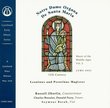| All Artists: Babbitt, Robert Taub Title: Milton Babbitt: Piano Works - Robert Taub Members Wishing: 1 Total Copies: 0 Label: Harmonia Mundi Fr. Release Date: 12/14/1992 Album Type: Import Genre: Classical Styles: Chamber Music, Historical Periods, Classical (c.1770-1830), Modern, 20th, & 21st Century Number of Discs: 1 SwapaCD Credits: 1 UPCs: 093046516024, 3149021351603, 314902135160 |
Search - Babbitt, Robert Taub :: Milton Babbitt: Piano Works - Robert Taub
 | Babbitt, Robert Taub Milton Babbitt: Piano Works - Robert Taub Genre: Classical
|
Larger Image |
CD DetailsSimilar CDs |
CD ReviewsBabbitt creates music of rare depth and beauty. Tom Furgas | Youngstown, OH United States | 05/10/2000 (5 out of 5 stars) "Babbitt's music is not an easy listen. It is complex, powerful, and sometimes strange. But never ugly, or complex for it's own sake. By extending Schoenbergs 12-tone "mode" to it's logical structural conclusion Babbitt has unlocked the mysteries of writing non-tonal music that is as beautiful in it's own way as tonal music (based on the overtone series) is. Somehow the "dissonance" of the non-tonal idiom is neutralized by Babbitts profound mathmatic-logical investigations. Just as the ancient Greeks used the Golden Section, or Bach the logical mathmatical internal relations of the fugue, or even Mandelbrot the exquisite calculations of fractal geometry, so has Babbitt utilized the (actually quite simple at the base of it) mathmatical structures of 12-tone tonality and it's implications to create art of sublime beauty. But not for everyone, and not easy to appreciate fully, even for the initiated. Music that repays attentive listening and open-mindedness." Effulgent beauty,erudite exquisite pieces scarecrow | Chicago, Illinois United States | 09/27/2001 (5 out of 5 stars) "Can't add much to the Babbitt brethren here,except merely to comment on 'ex cathedra' the 'Three Compositions',has still a compelling fascination, it's loose,high convulsive energy wonderful for a post war piece, 1947-1948. Can't say enough about the threadbare 'Duet', a mere 36 seconds duration a gestural bon-bon,arpeggiated mildly atonaly chords, to his daughter.'Semi-Simple Variations' from 1956 continued from the earlier excursions into violently controlled energy. I suppose we will listen to violent import in music differently with the new age terror permeating our consciousness now.Like wise 'Tableaux' and 'Canonical Form' are seminal works encompassing relatively longer durational frames, where Babbitt learned to layer the registers of piano timbre frequently writing on four separate lines.The beauty I think is the focus on particular tones, with dynamic indication as far as a fffff, as loud as possibly to barely perceptible. Elegance is the result as opposed to coldy wrought spatial distributions of tones as Stockhausen so successfully accomplished in his early "klavierstuck" 1 to 5 in particualr. Robert Taub simply comprehends this music wonderfully, a high level of precision mixed with profound muscianship renders great synergistic processes." Highly structured, but full of Humor Kekevan | York, PA | 10/22/1999 (5 out of 5 stars) "We need not be so quick to classify this music as "not for everyone." It's true that it is very demanding of its listener, quite complex, and highly structured in an intellectual manner, but it is first and foremost musical. Babbitt is one of the most humorous composers of our time, and his music invites us to stay in the moment (fleeting though those moments may be). This music has a playful, bubbly surface: it might be described as "friendly" in its atonality. This recording is a landmark, though not the last word on Babbitt's piano music."
|

 Track Listings (9) - Disc #1
Track Listings (9) - Disc #1


